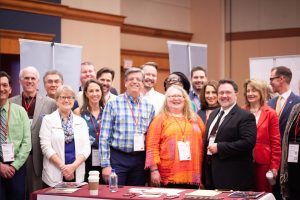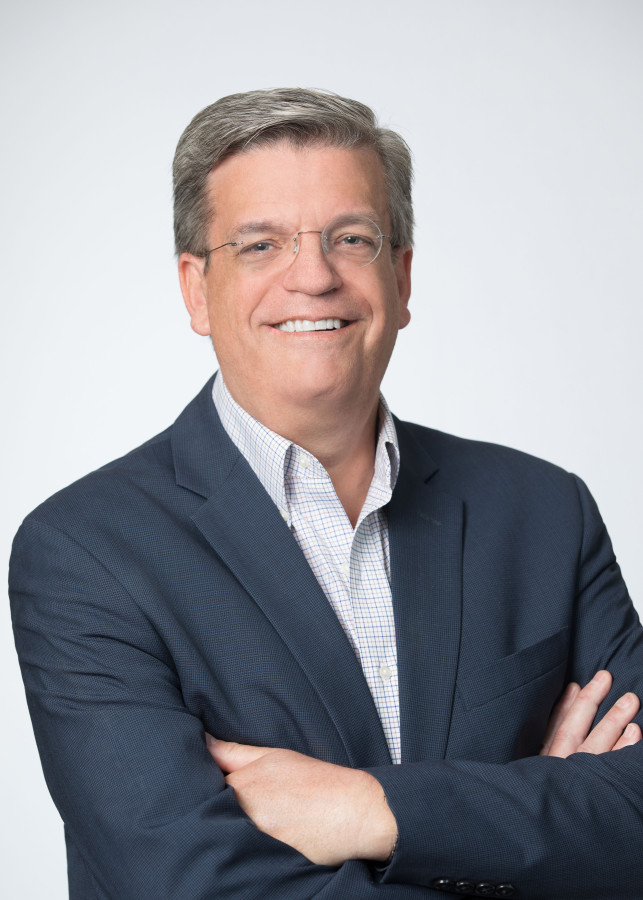Executive Decisions: Allen Henderson Steps Down as Executive Director of NATS

As Allen Henderson moves on after nearly two decades as executive director of the National Association of Teachers of Singing, he reflects on the major events of his tenure.
Like many young singers, Allen Henderson’s first experience with the National Association of Teachers of Singing (NATS) was through participating in the annual student auditions. Little did he know at that time, as an undergraduate music major, that he would eventually serve as executive director of NATS—the largest organization of teachers of singing in the world.1 Now, after 17 years in the position (plus another year as interim), Henderson is stepping down.
Looking back on his time in leadership, he is grateful for the initiatives he has been part of that helped the organization respond to both evolving demands and unforeseen challenges while still providing crucial professional development for countless singing teachers.

Early Involvement
As a graduate student, first in Tennessee and then in Ohio, Henderson found an important community among his local NATS members. After landing his first full-time teaching job in Oklahoma, his experience was much the same. “All the faculty where I was teaching were NATS members,” he says. “It was an immediate plug-in to the Texoma Region, which is a very active region and one of the largest regions we have in NATS. That really got me off to a good start. I felt like I had a lot of colleagues who were further along in the profession whom I could call on and who were good mentors.”
The mentoring opportunities continued in 1993 when he was selected to participate in the NATS Intern Program in only its third year of operation. He was assigned to master teacher Carol Kimball, who was then writing the first edition of her seminal text, Song: A Guide to Art Song Style and Literature. “That really was a major turning point—a major opportunity to really up my game as a teacher,” he says. “[Kimball] continued to be a really great mentor all the way through a lot of my career.”
In 1994, Henderson moved back to his home state of Tennessee, where he taught for the next 11 years. Having last lived there as a student, he suddenly found himself in the same NATS chapter and region with his first voice teacher and many of the professors he knew from his undergraduate and master’s degree studies. That is when he first started getting involved in NATS leadership roles, including positions at the regional and national levels, before taking the reins as executive director.
All along the way, he was always aware of the importance of NATS, both within and beyond the voice field. “For many years, even before I came on the scene in leadership, I think NATS was clearly looked up to around the world as an organization that really was a leader in our field and was respected,” he says. “It’s a great responsibility for people in leadership and the staff to ensure that it remains at the forefront, and that we continue to be a leader in the world and a leader in our field.”
Evolution of the Organization
Some of the more notable changes Henderson has welcomed during his time in office are growth in membership and broader access to new knowledge and new practices. “I talk a lot about feeling that we really have been in a kind of golden age of voice teaching, from the standpoint of all the things that are available to us as teachers,” he says. “The advances in voice science, all the knowledge that has expanded exponentially and helped us understand the voice more deeply, the diversity of how we teach and how it’s used in the world through music—all of that really has given us a much broader palette and a much broader opportunity to influence the teaching profession.”
NATS being a volunteer-based organization, he notes how collaborative some of the major initiatives of his tenure have been. The National Student Auditions, to name just one offering, is something that takes an enormous amount of volunteer effort and has grown tremendously since it started in 2014. In fact, many such initiatives started with a simple conversation among colleagues. “Either I would say, ‘What do you think about X?’ or somebody would say that to me, ‘What do you think about X?’ And we’d get to talking about it and we just kind of let that germinate a little bit and see what comes of it,” Henderson says.
He notes that there are just as many ideas “on the cutting-room floor” of his tenure as ideas that have come to fruition. So, part of his job has been to discern which to invest in and further pursue. At times, this has meant tempering some enthusiasm for a project in the interest of further discussion and analysis. “Sometimes something good happens [and] people want to rush ahead and do the next thing and the next thing and the next thing,” he says.
“One of the things I’ve tried to be is judicious and say, ‘Okay, let’s just give this a few years and see how we’re doing, and we’ll keep working on these other ideas. But let’s make sure we’re on a strong footing with this before we move in the next direction.’ And that seems to have worked well. It wasn’t ever a ‘No.’ It was ‘Okay, let’s keep refining this in the way that we want to grow and then find the right timing to say, Yes.’”
Even so, he acknowledges that many of the best ideas have come from the bottom up. “I’ve always felt that we are a member-driven organization, no matter who is ‘in charge’ or head of the staff,” he says. “So it really is important for the leadership and the board members to reach out to the membership at the region level and even the chapter level to float ideas and see if they have traction or if they have impediments that might not make them possible.”
Successful Initiatives
There are a few projects from his time as executive director that Henderson is particularly proud of. The first is the National Musical Theatre Competition. “Before we did that, there really never had been one in the country,” he says, “and we identified it as something that could be an outgrowth of NATSAA [the NATS Artist Awards], which had been going since the 50s.”
A second successful initiative is the So You Want to Sing book series. Recognizing that most of the existing vocal pedagogy books have been dedicated to Western classical singing, Henderson was looking for a way to serve the broader profession by helping teachers expand their skill sets. Of course, once a good idea takes off within NATS, it can be difficult to stop. “I never knew it would end up being 20 books when I thought of it,” he says.
He first considered topics he felt were obvious choices, like musical theatre, jazz, and rock and roll—which were the first three volumes published. “Then it just starts multiplying from there. ‘Oh, what about this? Oh, what about that?’ It’s another example of just shooting the breeze with different people, especially [series editor] Matt Hoch and a few others…I think it has been really something I’ve been proud of and excited about from the very beginning when we started it.”
Other successes of Henderson’s tenure were the resources NATS offered as a response to the COVID-19 pandemic. “We were there on the ground, and we were making things happen, and we were coordinating with other organizations and other important people in the world who could give us the knowledge we needed,” he says. He highlights the collaboration of NATS with other organizations, like Chorus America and the American Choral Directors Association, to “speak with one voice about [the pandemic] across the singing community.”
Henderson notes, “In retrospect, [it was] a really pivotal thing that we were able to do.” Those efforts have left lasting impressions on NATS members still today. “Even last week, when I was at the [Science-Informed Voice Pedagogy] Institute, I had two people come to me who were like, ‘I’m so grateful that NATS was there for me in the pandemic, because I would have just been lost. I would have not known what to do. I don’t know if I would still be teaching voice,’” he says.
Of course, leadership comes with challenges. For a large organization like NATS, with about 7,000 members in more than 35 countries, there is no pleasing everyone. Some will want to be on the forefront of change, while others will prefer to steep themselves in tradition. That is a balance that Henderson has always tried to be mindful of. “You want to respect history,” he says. “But if you have your ears and eyes to the ground, you know where the profession is moving. And you have to, as an organization that serves teachers of singing, be adept at identifying where things are moving…we need to ensure that we are serving the broader profession, while also respecting the history…That is always a hard road to navigate.”
Part of moving the organization forward involves encouraging people to continue learning and seeking to broaden their skill set. “There’s more for us to learn as teachers,” Henderson says. “There are students in your community who could benefit from you—who are really passionate about a variety of modes of performing and could really benefit from you having a broader skill set to serve them and their ambitions.”
Moving Forward
As his time in leadership comes to a close, Henderson is nothing but hopeful about the future of NATS. “I have trust in the leaders we have and the leaders that are in the pipeline coming along, that they’ll be as thoughtful as we’ve tried to be in the last 20 years or so,” he says. “But also [that] they’ll be as adventurous. I hope that we are never not thinking in adventurous ways about how NATS can impact our profession and how we can harness the power of our membership, and the ability of our members to do even greater things in the future.”
So, will Allen Henderson continue to be involved in NATS? “Oh, sure,” he says. “I’ll still be a NATS member. I’m going to continue teaching at my university position [at Georgia Southern University] for a while yet, so I’ll still have students doing NATS auditions.” That being said, he believes it is important to know when to step back to allow for new leaders and fresh perspectives. “They’ve got ideas that they’ll bring to the table,” he says. “We’ll continue to forge forward as an organization in even new and different ways that I would have never thought about.”
As other, more senior NATS members have mentored him throughout his career, Henderson is willing to continue serving in an advisory or mentorship capacity for individuals and for the organization. “I’ll be available to be called upon as needed,” he says. He added, with a smile, “But I’m also glad if people don’t want to call me, as well.”
Footnotes:
- “NATS Membership,” National Association of Teachers of Singing, www.nats.org/nats-membership.html (accessed June 29, 2025).
